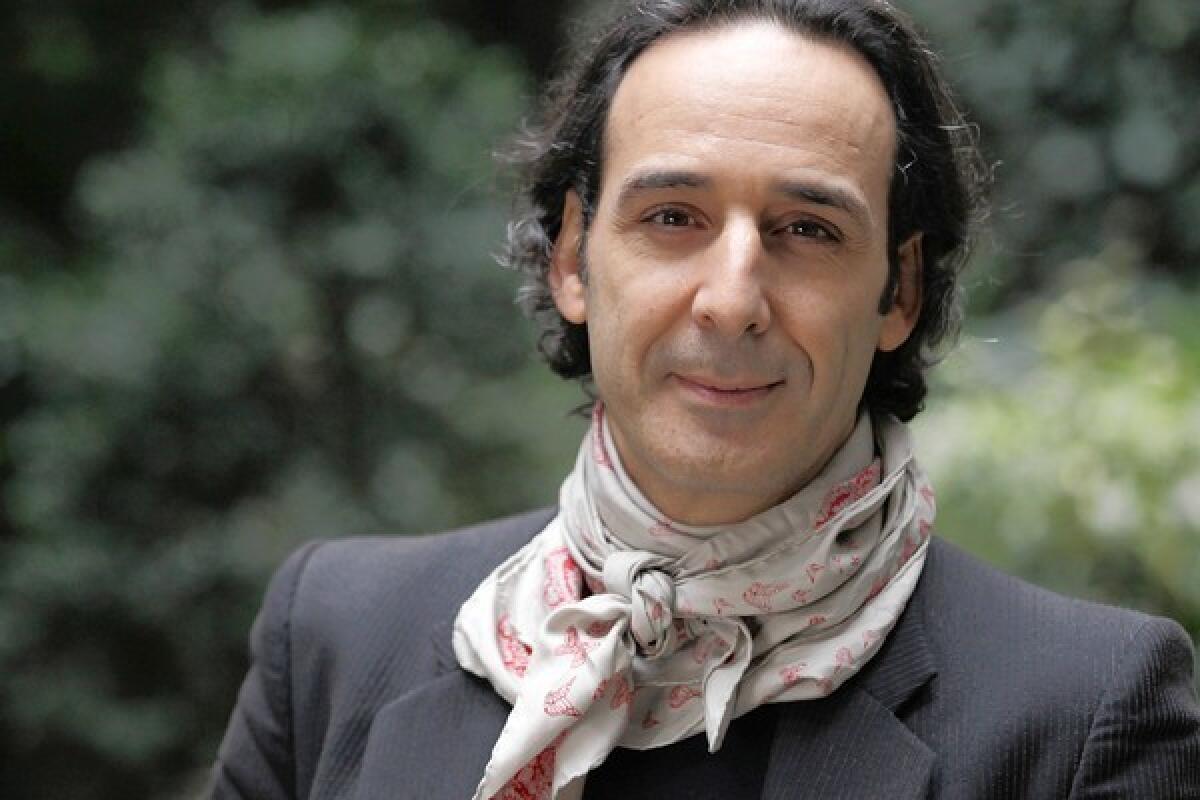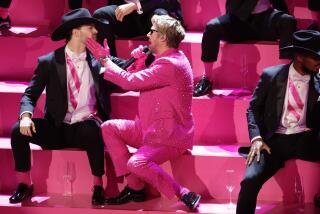Oscars 2013: Conductor John Mauceri applauds the nominated scores

- Share via
When the Academy Award for original score is announced Sunday night, there will be joy and disappointment — and Monday morning quarterbacking.
Some years the most important score is recognized, as in 1946 when Miklos Rozsa won for “Spellbound.” Or consider when the most important pre-”Star Wars” score, Max Steiner’s epic “Gone With the Wind,” did not, in fact, win. That statuette went to Herbert Stothart for the underscoring to “The Wizard of Oz.” (Then again, who today could even choose between those two, not to mention the amazing group of 1939 films whose scores were nominated?)
And then there was the year that Alfred Newman’s magnificent score to “The Robe” (released in 1953) was totally ignored, inspiring composer Franz Waxman to resign from the Academy of Motion Picture Arts and Sciences.
Oscars 2013: Nominee list | Ballot | Trivia | Timeline
It certainly must be frustrating to have composed a major score for a film that does not find critical and popular acclaim. The public generally links the value of a score with the fame of the motion picture.
I have always loved John Williams’ music to Steven Spielberg’s “A.I.” But few people know the music because the film is not considered one of Spielberg’s greatest achievements. That assessment may change over time, but program “A.I.” in concert and people will not quite know what to expect. It is, nonetheless, a work of genius.
This year’s “Moonrise Kingdom,” with its score by five-time nominee Alexandre Desplat, is a good example of an important score not nominated. Danny Elfman’s “Hitchcock” is another.
When I look and listen to this year’s nominated scores, I find they equally represent the dazzling vitality of film music as well as the incredibly varying demands made on film composers.
Consider the requirements of scoring “Argo,” also by Desplat, as opposed to “The Life of Pi.” The former is an action film of great suspense that hardly needs music to drive its narrative. In the latter, we spend an hour in a lifeboat with a boy and a tiger, who, unlike Tigger, does not talk, sing or dance. In no way did Desplat have an easier time writing “Argo” than Mychael Danna had in writing his sweeping orchestral descriptions of magical events of wonderment, unencumbered by dialogue, for “Pi.”
These are just different challenges, brilliantly met by the nominees.
Orchestras may wish to play the sparsely scored and rhythm-based music of “Argo” as stand-alone music, especially if the film continues to be so admired. “The Life of Pi” is a natural for concerts, either “live” with film or, better yet, as a stand-alone symphonic work of unfolding miracles.
Play-at-home ballot: Have you made your picks yet?
With the latest James Bond film, “Skyfall,” Thomas Newman entered new and dangerous territory. How can one put a personal stamp on a movie franchise that is indelibly linked to a musical sound — a sound that has been heard by untold millions and adapted for a half century?
That Newman, who was 7 when “Dr. No” was released in 1962, manages this with grace, wit and genius makes his nomination all the more gratifying. We hear Newman’s DNA throughout the extremely long score, and yet he knows that we also need to hear the two leitmotifs, the sexy one on the twanging electric guitar and the other, a chord progression that rises and falls with the power of a wildcat about to spring.
Should Newman win, it will be the first time a James Bond score has been so honored.
When the academy voters assess the effect of Dario Marianelli’s score to “Anna Karenina,” it has to judge the double duty done by the music. Like Rozsa’s score to “Madame Bovary” and Steiner’s score to “Jezebel,” some of the music in the film is meant to be heard by the characters. Sometimes it is underscoring the dramatic scene, and like the other nominated scores, is to be heard only by the audience.
James Bond does not hear his theme. Pi hears wind and the sloshing of water against the boat, not a symphony orchestra and chorus floating just off camera. Therefore, Marianelli was challenged to create music that Anna Karenina might have actually heard at a grand ball. The editing of the on-screen orchestra is matched by the orchestrations of the music.
Because of the brilliant writing, we know the difference and accept the conceit. It also meant that Marianelli had to compose in a style that sounds Russian to us, making reference to the romantic Russian musical vocabulary of Alexander Glazunov, a contemporary of “Karenina” author Leo Tolstoy.
OSCARS 2013: Full Coverage | Oscar Watch | Buzzmeter
And that brings us to John Williams. At this point, I just bow my head to this great man. I last saw John at the memorial service for Ernest Fleischmann, the longtime chief executive of the Los Angeles Philharmonic. He exclaimed, “John! Do you believe I am writing three scores right now? ‘Tintin,’ ‘War Horse’ and ‘Lincoln’?!” And, no, I could hardly believe it.
With “Lincoln,” John summons his own deep modesty and strength, channeling the same sources that once inspired Aaron Copland’s “invention” of the American orchestral sound. That John Williams is precious is, I am sure, known to all. Nothing need be added by this writer.
The film music students at the University of North Carolina’s School of the Arts, where I am about to complete a seven-year tenure as chancellor, were asked to comment on all these scores, and it is reassuring to hear their admiration and knowledge of the field they are about to enter. Seldom was heard a discouraging word, I should say, because they know just how challenging it is to succeed in the art of composing for this medium.
Film scoring is the most vital arena for orchestral music and, despite all the ethnic colors found in the nominated scores, when a major triad rises to embrace a scene, it gives us a sense of home and resolution. It gives us hope.
Mauceri is the founding director of the Hollywood Bowl Orchestra and the chancellor of the University of North Carolina School of the Arts.
MORE OSCAR COVERAGE
VOTE: Play-at-Home Oscar Ballot 2013
TIMELINE: Academy Awards through the years
More to Read
From the Oscars to the Emmys.
Get the Envelope newsletter for exclusive awards season coverage, behind-the-scenes stories from the Envelope podcast and columnist Glenn Whipp’s must-read analysis.
You may occasionally receive promotional content from the Los Angeles Times.










